Holy Smokes! Should We Allow “Bad” Operators to Operate?
Should we allow “bad” operators to operate? This is not meant to be an easy question to answer. The reality is we allow “bad” car salesmen to sell cars, but we have limits on what they can do legally to protect customers. In most other industries, market forces drive who is perceived as “good” and who is perceived as “bad,” as consumers vote with the dollars they spend.

Should we allow “bad” operators to operate? This is not meant to be an easy question to answer. The reality is we allow “bad” car salesmen to sell cars, but we have limits on what they can do legally to protect customers. In most other industries, market forces drive who is perceived as “good” and who is perceived as “bad,” as consumers vote with the dollars they spend. So, the question I propose to my readers is: In the waste and recycling industry, should we let operators unwilling to do the things necessary to ensure a safe environment for their employees and/or cause harm to the public to continue to operate?
Just to be clear, I believe that since our industry’s supply chain was invaded by lithium-ion batteries in 2018, the waste and recycling industry has become one of the most fire safety-conscious and fire forward-thinking industries. Many of the major operators, along with their independent and municipal counterparts, have made significant investments in operational best practices, fire technology and public education to help stem the seemingly ever-increasing lithium-ion battery and traditional hazard problems that have been thrust upon us. Our industry is leading the world with fire safety innovation, operational best practices and new technologies such as our Fire Rover solution. The fact is most countries accept or adopt the National Fire Protection Association’s standards, which was created and developed in the United States, and U.S.-based FM Global and Underwriter Laboratories Inc. certifications that are respected across the globe.
Most of us in the industry would agree fire/disaster response manuals have been taken off the shelves and are finally living, breathing documents that are actively taught and learned by staff. Operational best practices like clearing tip floors more often, proper pile segregation and constantly moving material are, with some exceptions, getting much better. For example, the industry is starting to understand that dragging an item outside of the building is not “best practice” when considering deep-seated fires that require first wetting the pile and then peeling away like shown in the video below
Investments in equipment, whether it be tools for the fire department to use when first onsite to fight the fire quickly or sprinkler systems and early detection solutions like our Fire Rover, are happening more often.
But even with all the work and investments in fire education and safety, fire incidents in the waste and recycling industry are still increasing. If you take one look at June’s numbers, you will see what I mean.
June 2023 Fire Data
In June, we encountered 44 publicly reported fire incidents at our waste and recycling facilities. Of those incidents, 27 occurred in waste, paper and plastic facilities, six occurred at scrap metal recycling facilities, five occurred at construction and demolition sites, three occurred at organics sites, two occurred at hazmat recycling facilities and one occurred at an electronics recycling operation. At Fire Rover, we had an extremely busy month, responding to more than 450 hot spots and/or fire incidents at our clients’ facilities. We even hit a record day where we successfully detected and extinguished six separate fire incidents at a combination of our waste, scrap and hazardous material operations.
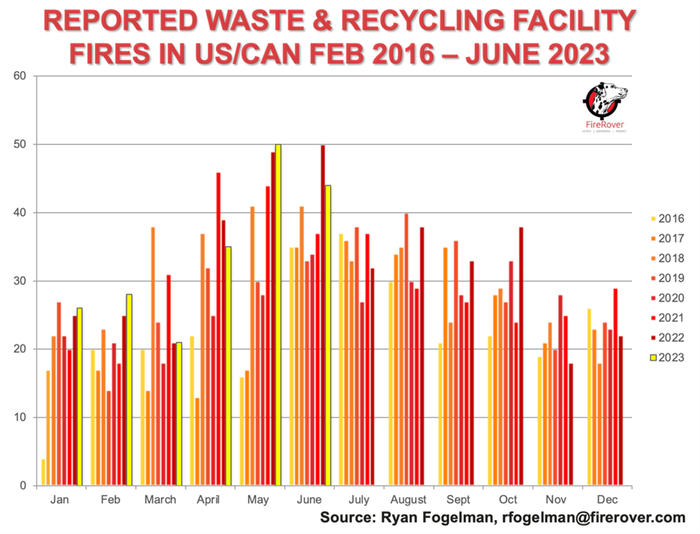
The fact is a number of these companies are not “bad;" they simply cannot afford to make the investments required not to have fires. My economist's response to this is their pricing needs to be adjusted. As customers of a product and/or service, we the public need to pay our fair share of the cost to pick up our waste, recycle our materials and deal with the problems we create. The manufacturers of lithium-ion batteries are making huge profits. I am not faulting them for that, but when their products are causing a significant amount of damage across the globe, they need to be held responsible. It is not unheard of for the government to tax an industry while at the same time providing monetary support to the operators in the form of training, technologies and resources needed to have a safe and well-oiled waste and recycling industry imperative for every single American today. One cannot argue that waste and recycling is a mission-critical industry today and, more importantly, in the future.
If a small business cannot pay its bills, it either raises its pricing accordingly or closes its doors. Of course, most businesses are not open for the public good and, like the waste and recycling industry, should be viewed the same way as a utility. Your local government has the responsibility to pick up our waste, so it needs to find a way to pay for it directly by raising costs or indirectly through government support/programs.
It might cost less on paper to do something now than in the future. However, the issue is the consequences can be so drastic when a large or catastrophic fire occurs at these facilities. Outside of the direct loss to the operator and their insurance company, the direct and indirect costs to the public include injuries to firefighters, the cost of water to fight the fire, the firewater leaching into the environment and the loss of infrastructure to efficiently and adequately remediate or discard our waste. That is all to clean up the incident, but it also can cost upward of $50-plus million to rebuild along with the 24 to 36 months of downtime during development where the business is not processing any material, not to mention the increased insurance cost for the remaining operators. Therefore, it is in everyone’s best interest to stop these fires from occurring in the first place.
The Fire Department Can Not Be Your First Line of Defense
It is unacceptable to demand that your fire department be the first line of defense for these businesses. There are 1.2 million firefighters in the U.S. today, and most of them serve on a voluntary basis and receive limited training. They are professionals, but no fire department wants to fight these fires. They are already faced with enough dangerous hazards, including dealing with electric vehicle or lithium-ion battery fires on an increasing basis, so they certainly don’t need to be engaged to fight a fire when it's not 100% necessary.
I am by no means saying all companies should train their employees to fight a fire, but they are in the best position to stop a potentially major fire incident in its tracks. Having piles that are so high they reach the ceiling in some cases is not acceptable. Not having a fire alarm, fire sprinkler or fire protection in a building is unsafe. By most accounts, we have about 10,000 waste and recycling facilities in the U.S. and Canada. Installing early detection technologies and sprinkler infrastructure can help provide proper protection for the area and occupancy.
I hate to be the bearer of bad news, but in my professional opinion, things are not getting better anytime soon. Last year's record of reported fire incidents might be a high-water mark, but in 2023, we are only five incidents shy of the 209 reported incidents we had in the first six months of last year.
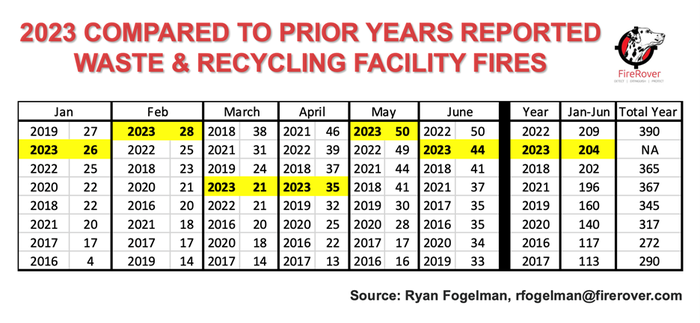
The scary thing is both 2022 and 2023 have been worse than all other years since I began reporting these incidents in 2016.
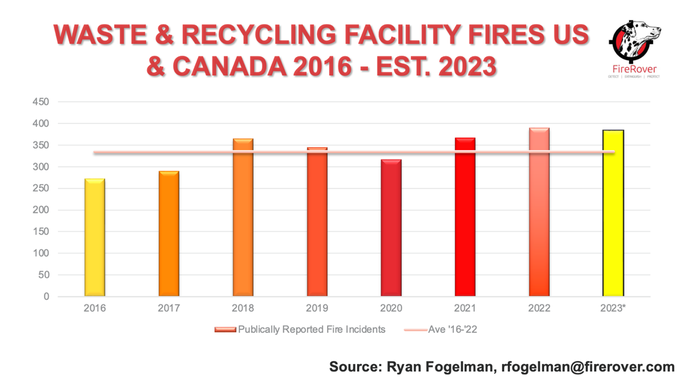
Put in another way, when we look at annual reported waste and recycling facility fire incidents, 2023 is forecasted to end slightly better than 2022, but both are still higher than the 335 average we’ve seen since 2016, and we have no idea what the back half of this year will have in store for us.
We are in desperate times where the major original equipment manufacturers (OEMs) are not asking but begging the public to help with this cause.
As I highlighted in my "6th Annual Waste & Recycling Facility Fires Annual Report," I estimated $2.5 billion dollars was spent dealing with fire incidents at our waste and recycling facilities that made it to the “major fire stage.”
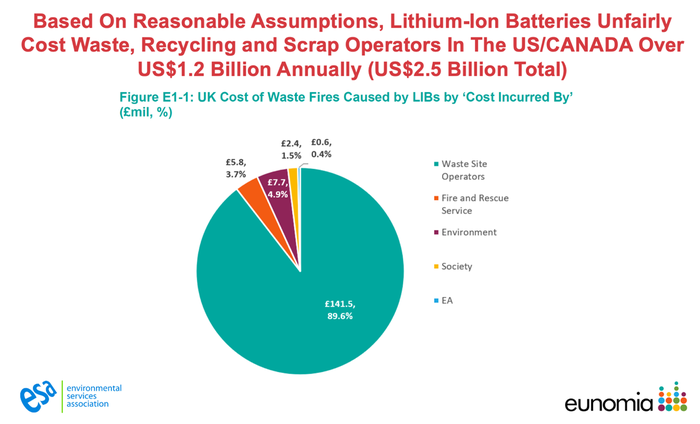
Those costs were endured by the waste and recycling operators, their insurance companies and the local fire departments that had the majority of 56 reported injuries fighting these fires from last year alone.
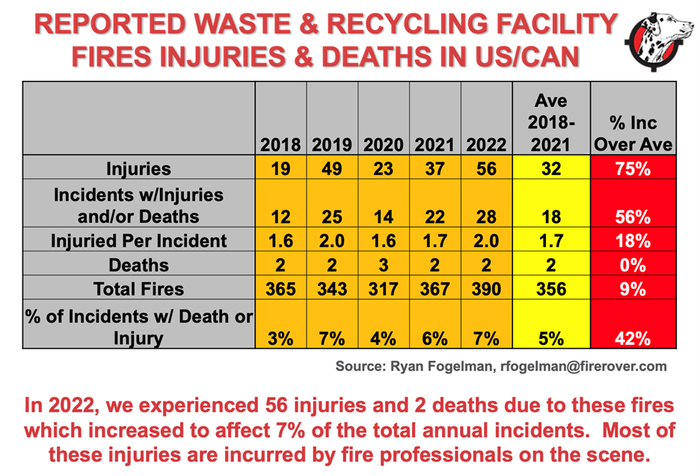
Insurance Companies Are Demanding It
If you haven’t already heard, insurance companies are demanding it. The days of waste and recycling facilities flying under the radar are over and have been since the original lithium-ion wave in 2018.
The issue is similar to the Ralph Nadar days of the ‘60s, when automotive OEMs accepted a share of injuries and deaths when they could have prevented them with some simple investments in safety technology. For some companies, the cost of having significant fire incidents at their facilities is less expensive than investing in the proper equipment to mitigate the risk of this happening. However, to make this determination, operators need to include ALL the costs, direct or indirect, to the public at large, which include wasted fire professionals' time, effort, potential injuries, less fresh water used, no environmental hazards caused by firewater and so on.
Conclusion
It's time we demand companies stop rolling the dice when the odds of a significant fire in a 12-month period are conservatively 4% to 8%, with the potential to grow due to the hazards still entering the waste and recycling streams. Especially when we have operational best practices and fire prevention tools proven to reduce that number by well over 90%. We the public and our government need to step up and get these operators the proper fire safety protection to do work imperative to our American lifestyles. We cannot allow the costs of inaction to be OK, but we need to be fair and take responsibility for the problems we are seeing in the waste and recycling streams and now in our homes, high-rise buildings, businesses and more across the globe. It’s time for everyone involved to pay their fair share to ensure we have a safe, healthy and stable industry, not just leave it to the operators and their insurers to foot the bill while the public points fingers at the operators that suffer fires and label them as “bad” operators as opposed to victims dealing with seemingly insurmountable fire hazards in their material streams.
Ryan Fogelman, JD/MBA, is vice president of strategic partnerships for Fire Rover. He is focused on bringing innovative safety solutions to market, and two of his solutions have won the distinguished Edison Innovation Award for Industrial Safety and Consumer Products. He has been compiling and publishing the “Reported Waste & Recycling Facility Fires In The US/CAN” since February 2016 and the “Waste & Recycling Facility Fires Annual Report.” Fogelman regularly speaks on the topic of the scope of fire problems facing the waste and recycling industries, early detection solutions, proper fire planning and early-stage fire risk mitigation. Additionally, Fogelman is on the National Fire Protection Association’s Technical Committee for Hazard Materials. (Connect with Ryan on LinkedIn at https://www.linkedin.com/in/ryanjayfogelman or email at [email protected])
.
About the Author
You May Also Like




